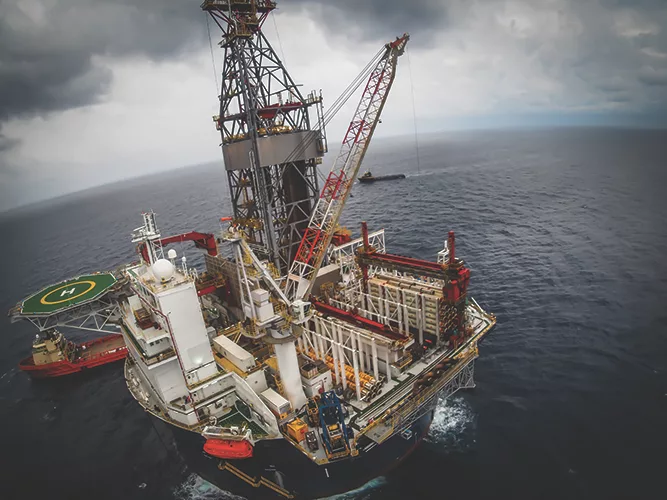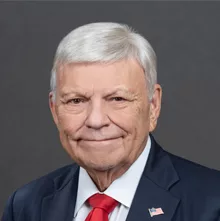We are midway through the fourth quarter of 2023, with the Biden administration continuing its quest to eliminate U.S. development of fossil-fuel resources. President Joe Biden announced a plan to sell the fewest oil and gas lease sales in history. The administration announced selling only three offshore oil and gas leases over the next five years. For the years between 2024 and 2029, the Department of Interior (DOI) will engage in a maximum of three potential oil and gas lease sales in the Gulf of Mexico region scheduled in 2025, 2027 and 2029. No oil and gas lease sales will occur in the Atlantic, Pacific and Alaskan waters during this period.
The minimum number of leases will allow the agency to continue expanding its offshore wind leasing program through 2030 in compliance with the Inflation Reduction Act (IRA).
Mike Sommers, president of the American Petroleum Institute, says the Biden administration opts for “failed energy policies.”
“This restrictive offshore leasing program is the latest tactic in a coordinated strategy to reduce energy production, ultimately weakening America’s energy dominance; limiting consumers’ access to affordable, reliable energy; and compromising our ability to lead on the global stage,” he notes.
Regressive policies such as the DOI lease program will harm Americans by putting upward pressure on energy prices at the pump, destroying good-paying jobs in the Gulf Coast communities, and will benefit energy production in Iran, Russia and China, notes Erik Milito, president of the National Ocean Industries Association. He calls the plan an “utter failure for the country.”
In May of last year, the DOI canceled three of the remaining oil and gas leases scheduled under the ongoing leasing plan ending this year. The IRA legislation forced the Biden administration to reverse the decision.
Out of the three, only Lease Sale 261, mentioned in last month’s column, remains for now. The sale was scheduled for Aug. 25, 2023, and has been delayed by administration litigation. It was rescheduled for Nov. 8, 2023.
Oil Prices Analyzed
The current pricing for oil as of this writing sees WTI at $ 82.69/barrel and Brent at $ 84.47/barrel, predicated on worries related to the global economy, interest rates, gains in the U.S. dollar and clouded demand outlook.
Analysts from Standard Chartered, a British multinational bank, highlight in their report that they do not think the recent price dynamics carry much in the way of new information.
“We see this as a burst of volatility in a market where volatility was too low, combined with end-of-quarter rebalancing effects and the stopping out of some of the most recently added and least committed crude oil longs, particularly among the momentum followers,” the report notes.
“Our Brent average forecast for Q4 remains at $93/barrel. While we have maintained this forecast for the past 15 months, we think our projected supply and demand balances for Q4 support it,” analysts continue. “Given our fundamental forecasts, we do not expect dips below $90/barrel to prove sustainable.”
Progress Slows on Public Infrastructure Projects
Construction spending growth looks solid going forward, notes Anirban Basu, Associated Builders and Contractors’ chief economist. It is “driven in large measure by several massive construction projects in the development or early construction stages.”
He adds that, despite solid expectations for construction spending growth, drops in public construction categories jolted those expectations. The segments that depend most on bank financing are “poised to weaken going forward.”
Ken Simonson, chief economist for the American General Contractors of America, notes that construction spending suggests no letup in demand for construction workers or private-sector projects.
He still cautions that progress on many public infrastructure projects is likely undermined due to a flurry of regulatory measures from the Biden administration. “Contractors are frustrated by the slow pace of new public project awards,” Simonson says.
The greater Houston area is the home to a wealth of fourth-quarter project kickoffs, per Industrial Info Resources (IIR). The area is home to more than seven million people and comprises nine counties: Austin, Brazoria, Chambers, Fort Bend, Galveston, Harris, Liberty, Montgomery and Walter counties. The area’s massive petrochemical complex is supported by the Houston Ship Channel.
This area also has nearly $71 billion worth of projects in various stages of development being tracked by IIR.
They are comprised of 77 projects worth $5.46 billion planned for fourth-quarter construction kickoffs. The power industry leads the way with 15 projects totaling more than $2 billion, followed by the chemical processing sector with 34 projects valued at $1.4 billion, and the oil/gas production sector with two projects valued at $1.3 billion.
Global Hostilities PT PVF Products at Risk
Pricing for the carbon-steel butt-welding fitting and forged-steel flange sector is stable. It should remain so in the ensuing quarter, barring any unforeseen disruption in the supply chain or raw material increases.
As of this writing, U.S. supply chains for offshore raw materials, finished and unfinished PVF products (i.e., welding fittings, forged flanges, steel pipe and valves) are at high risk because of several issues: the uncertainty of continued U.S. support for the war in Ukraine (exacerbated by the loss of U.S. Rep. Kevin McCarthy as speaker), the escalation of aggressive behavior of China toward Taiwan, hostilities in the Mideast and Israel’s declaration of war with the Palestinians (Hamas).
Those dependent on offshore sources should, if they have not already done so, prepare contingency plans for worst-case scenarios. Predicated on many conversations with knowledgeable people, it is no longer if but when hostilities will erupt, causing chaos in our supply chains.
Again, a note of caution: Many companies have engaged sources from Vietnam as a contingency plan for supplies of carbon-steel butt-welding fittings.
If these products were produced from Chinese rough fittings, it could be an attempt to circumvent specifications barring the use of Chinese material on domestic projects funded with taxpayer funds. In addition, it would be a circumvention of U.S. anti-dumping orders for 12-inch and smaller fittings that have been in force for several years.
With the rise in megaprojects, the pressure on the supply of labor and material supply chains is exacerbated, especially for smaller construction projects.
Megaproject demands are draining the pool of skilled labor by drawing large numbers from local markets, presenting problems for smaller construction projects in various sectors of our industry.
PVF Roundtable News
With this in mind, the PVF Roundtable continues to work diligently to support the education and training of young associates for the PVF sector by providing scholarships through the PVF Roundtable Charitable Foundation.
The next meeting of the PVF Roundtable will be the Christmas Meeting on Dec. 12, 2023, from 4 p.m. to 7:30 p.m. CDT at The Bell Tower on 34th, Houston, 713-868-2355.
Please put this meeting on your calendar, register early and please bring a gift or donation for those in need.
Major announcement: This year, the PVF Roundtable exceeded $2 million in total scholarships distributed by the PVF Roundtable Charitable Foundation since its inception. These scholarships are given to trade schools and universities for the development of a skilled labor force to meet the increasing demands of the PVF industry.
Distributions for the first half of 2023 were announced at the Oct. 10 meeting. The scholarships awarded at the meeting were: ABC Pelican Schools, Baton Rouge, La., $65,000; Lamar Institute of Technology, Beaumont, Texas, $65,000; Houston Community College, Houston, $65,000; Lee College, Baytown, Texas, $65,000; San Jacinto College, Pasadena, Texas, $65,000; and DelMar College, Corpus Christi, Texas, $25,000.
The PVF Roundtable Golf Tournament and TroutBlast were the major fundraising events scheduled in 2023. The Weldbend Corp., Ferguson Industrial and MRC Global were key sponsors of these events.
As a member of the board of directors, and I speak for all members, we sincerely thank you for your participation in these events.
With the uncertainties in the current turbulent PVF market, these meetings are a unique venue for you and your associates to network with your peers in the PVF industry. These events provide the platform to share information, discuss pertinent issues, meet new contacts, develop new, long-lasting friendships, and pursue new opportunities in the industry.





